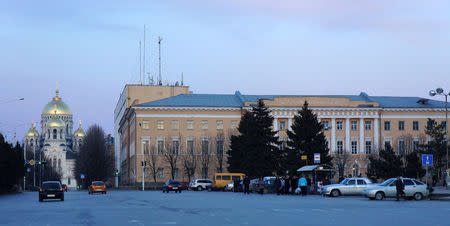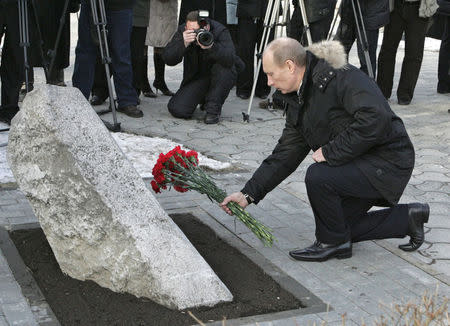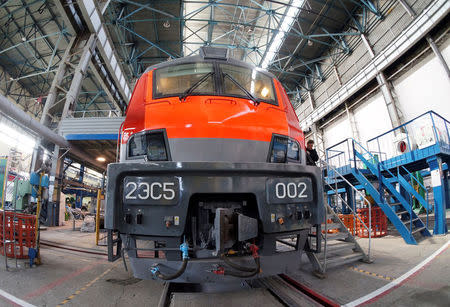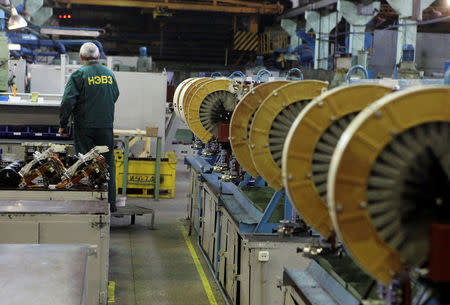City where Soviet workers rose up stays calm in Russian crisis
By Jason Bush NOVOCHERKASSK, Russia (Reuters) - Valentina Vodyanitskaya shows little emotion when talking about the bloody events in her home city in Russia more than half a century ago, despite being locked up in Soviet labour camps for years as a result of them. "People simply lost their head," she says of a rare spasm of labour unrest which gripped Novocherkassk in 1962, when the city 600 miles (965 km) south of Moscow was part of the Soviet Union. Soviet troops shot dead 26 people and wounded 87, according to official figures, as they quelled dissent caused by a rise in food prices and an increase of production targets, under Soviet Communist leader Nikita Khrushchev. "They (the workers) had put up with it and put up with it. But if you treat the Russian people like a pig long enough, then eventually they will grunt," said Vodyanitskaya, who is now frail and in her late seventies. Then aged 24, Vodyanitskaya was convicted of participating in the labour unrest and served five years in labour camps. She now curates a museum devoted to the events of 1962. The episode, covered up for 30 years, was one of the few occasions when people protested en masse against economic hardships in the Soviet Union. It is a reminder that even the stoical Russian people have a breaking point. But though Russians are again feeling economic pain now, a visit to Novocherkassk suggests history is unlikely to repeat itself, at least for as long as President Vladimir Putin is in charge in Russia. About a dozen interviews with local residents suggest that most, despite their hardships, remain loyal to Putin. In an echo of the events of 1962, some blame local decision-makers rather than the Kremlin for their problems. But, unlike in 1962, those who have become disenchanted say they are too afraid to protest. CRISIS CONDITIONS Once the capital of the Don Cossack horsemen who roamed southern Russia, Novocherkassk has a sleepy provincial feel, with crumbling nineteenth-century buildings lending an air of faded elegance. It is only in the gritty suburbs, along dusty roads past concrete high-rise apartment blocks and factories, that Novocherkassk's status as a substantial industrial city of more than 170,000 people becomes obvious. Russia's economic crisis, fuelled by low oil prices and compounded by Western sanctions over Russia's role in the Ukraine crisis, has hit it hard. "Pay has fallen and therefore many try to look for alternative work," said Alexander, an electrician at the Novocherkassk Electric Locomotive Plant, whose workers were at the centre of the unrest more than half a century ago. Fewer factory orders meant his monthly pay was now about 18,000 roubles ($275) a month, down from 30,000 a year ago, he said. The factory's management declined to be interviewed. But Alexei Miloserdny, head of its trade union committee, said the factory's problems were manageable and that pay would be increased in line with inflation this year. "Everything you read here is true!" he said, waving a hand at Soviet-style banners over the gates that express the plant's pride in its 80-year history. One reads: "Glory to the creators of powerful home-produced electric locomotives!" Conversations with workers at the plant suggest many agree it will weather the downturn with government help. "The people are satisfied. The authorities listen to them. I think it will never come to a confrontation like (1962)," said Vasily, an engineer waiting for a tram near the factory gates. Support for Putin is strong even among some of those with most reason to be discontented. Sergei Ivanov, a taxi driver who lost his job at another local factory, said there were days when he did not have a single customer because of the "very bad" economic situation. But he is phlegmatic: "Of course there are no sorts of protests, thank God. Why not? Probably because we believe everything will be alright. I believe in Putin." Putin's foreign policy actions, notably his 2014 annexation of Crimea, seen in Russia as putting right a historical wrong, have buttressed his popular image as the people's saviour among current or former factory workers like Ivanov. People's willingness to accept lower wages has also helped avert social and political unrest similar to the demonstrations in large Russian cities in 2011-12 that briefly challenged Putin's government. But outside the blue-collar core, among public sector workers, youth and the embryonic middle class, patriotic slogans appear less effective. APATHY AND FEAR Lyubov Novoselskaya, 55, a teacher at a school for disabled children, used to support Putin but has become disillusioned. "Pay is the same as it has been for at least five years. And prices have jumped several times," she said. "We live on cabbages and potatoes!" She has little inclination to take to the streets though. "There is silence among people because people are afraid," she said. "They are afraid of losing their jobs." Roman Revunov, 32, an economics lecturer and activist for Open Russia, a liberal opposition group, said such fear was typical among those who grew up in Soviet times but that young people now were less willing to conform. "The protest mood will increase insofar as the situation worsens," he predicted. "Yes, now we are under the influence of strong propaganda, from television and so on. And there is fear. But this resource isn't infinite." He cited a recent campaign by environmentalists against construction work in a local beauty spot as an example. But not everyone who participated in the protests, which attracted only a few hundred people, is optimistic they will gain momentum. "People don't believe (protests) can change anything," said Timur Bakhtiev, a lawyer who took an active part but is now thinking of emigrating. "It's true they don't change anything because they're too small. It's a vicious circle." The localised nature of any mood to protest in Novocherkassk is nothing new. Locals old enough to remember say the events of 1962 reflected anger at local incompetence rather than broad discontent with the central social or political order in Moscow. "In any country or in any town you can find idiots," said Vodyanitskaya, jabbing her stick at a black-and-white photograph of Boris Kurochkin, the factory boss she blames above all. It was his order to raise production targets, in effect slashing pay on the same day the government raised food prices, that caused workers to snap, she said. Vodyanitskaya is reluctant however to draw broad political conclusions about the state and society that condemned her to years in labour camps. "We don't have the right to condemn the leadership," she said. (Editing by Andrew Osborn and Timothy Heritage)

 Yahoo Finance
Yahoo Finance 



